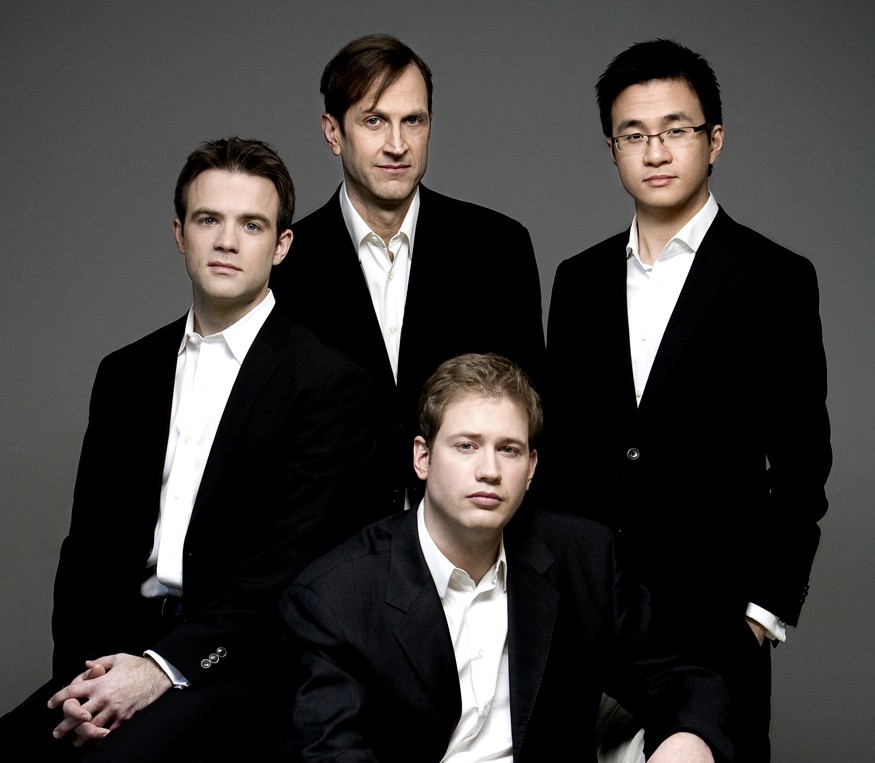New Orford Quartet opens Winter Chamber Festival in admirable style
The Winter Chamber Music Festival opened its 2017 edition Sunday night in Evanston. With the Chicago Symphony Orchestra on a European tour, this year’s lineup is even more dependent on guest artists than usual.
But with several first-rate ensembles on tap, the schedule is a promising one, and the New Orford String Quartet got the festival off to an admirable start at Pick-Staiger Hall.
The Canadian quartet, which made its festival debut in 2015, is made up of principals from three major orchestras: Andrew Wan and Brian Manker are, respectively, concertmaster and principal cellist of the Montreal Symphony Orchestra; Jonathan Crow is concertmaster of the Toronto Symphony, and Eric Nowlin is principal violist of the Detroit Symphony.
If the performances proved somewhat inconsistent in interpretive depth and individuality, the playing was unfailingly polished, well-prepared and responsive, with the musicians’ informal introductions creating an inviting and unstuffy atmosphere.
The quartet elected to flip the order of the first half, leading off with Uriel Vanchestein’s Les veuves (The Widows). Based on a poem by Québécois polymath Richard Desjardins, Vanchestein’s music reflects the unusual scenario, fleshed out by Crow’s wry and witty introduction. Woodcutters come to despoil the peaceful ancestral land of the Abenakis, and are confronted by an indigenous woman. She locks them in a cabin and sets fire to it, killing them all and leaving their wives widows.
That frolicsome scenario is reflected in the Canadian composer’s music. Viola tremolos set a tense mood with nervous quick passages for the violins. A warm theme for cello, elegantly played by Manker, reflects the peaceful existence of the Abenakis. Col legno bow tapping paints the settlers’ aggressive chopping down of the forests and the violent denouement is clear in the dark, agitated music and malign fugue, before fading out with a hushed cello pizzicato. Vanchestein’s music is ultimately less interesting than the tale it evokes but the New Orford members provided fine and focused advocacy to their compatriot’s work.
A much better known quantity is Debussy’s String Quartet in G minor, his only work in the genre and one of the young composer’s early successes.
The opening movement was aptly Animé as marked yet the New Orford’s playing felt too literal and straightforward—boldly projected but missing some of the quicksilver quality and subtler hues and dynamics of this restless music.
Following that, the playing went from strength to strength in a performance that made Debussy’s 1893 work feel remarkably fresh and modern. The lively, mercurial qualities of the second movement were well captured with seamless, piquant interplay of pizzicatos and rhythmic turns.
The performance was at its peak in the Andantino despite a cacophony of hacking coughs, including from an infant–who brings a baby into a chamber concert? The New Orford musicians maintained impressive concentration with refined and communicative playing, and their inward, eloquent expression had one hanging on every phrase. The finale’s quirky energy and gear-shifts were handled with seamless artistry and skill, rounding off a performance that made one appreciate anew how original and ground-breaking a work Debussy’s quartet is.
Beethoven’s String Quartet in E flat major, Op.127, made up the second half. Here too, there was much that was positive in the New Orford’s take on the first of Beethoven’s remarkable final survey of quartets: the well-judged mix of maestoso weight and bumptious vitality in the first movement, and the off-centre joviality of the Scherzo.
Yet the epic Adagio that is the heart of the work proved a disappointment. Though carefully played with markings acutely observed, the performance stayed all on the surface with the expressive depths of the most interior variations barely hinted at. One wondered if the hectic schedules of these front-desk players allows sufficient rehearsal time to dig into this music with the degree of depth and preparation such scores require.
The New Orford Quartet showed more convincing Beethoven bona fides with their encore of the Cavatina from the Quartet in B flat major, Op.130. Rich of tone and rendered like a glowing benediction, the deep vein of warm feeling sent the audience out fortified to brave the chilly night.
The Winter Chamber Music Festival runs through January 29. The Kalichstein Laredo Robinson Trio performs music of Brahms, Shostakovich and Ellen Taaffe Zwilich 7:30 p.m. Friday at Pick-Staiger Concert Hall.
events.music.northwestern.edu/tags/winter-chamber-music-festival
Posted in Uncategorized



